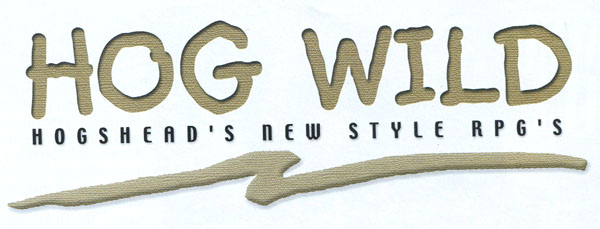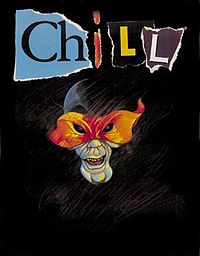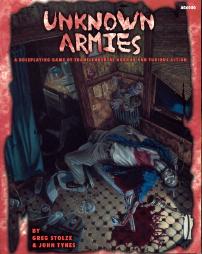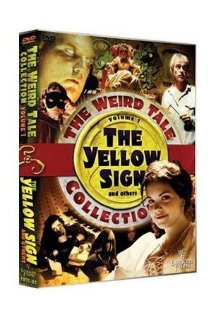This article originally appeared in the March 2001 issue of Games Unplugged.

John Tynes built a reputation of excellence with products from Delta Green to Unknown Armies. In the fall of 1999 he helped to cement that reputation with his dual New Style offerings: Puppetland and Power Kill. In July he took the time to answer a few questions I had…
So here you are. How did you start playing RPGs to begin with?
When I was…oh…eleven or twelve in Memphis, Tennessee, I was friends with a kid named Chris Brown, who was a year or two older than me. He was playing AD&D and got me started on it.  Eventually I bought Chill and got into the idea of horror gaming. Some dabbling with Call of Cthulhu followed, and off I went.
Eventually I bought Chill and got into the idea of horror gaming. Some dabbling with Call of Cthulhu followed, and off I went.
How did you get involved with the New Style line of games?
I’ve been friends with the head of Hogshead Publishing, James Wallis, for years. We’d been talking about finding a way to work together, and the first project that worked out was when James asked me about publishing my freeware game Puppetland in an expanded and illustrated edition, along with Power Kill.
Having worked on the line, what do you think of the entire “New Style” concept? What does “New Style” mean to you?
I think James Wallis has done something interesting with the line in that he’s presenting the idea that fun RPGs can come in small packages, without simply being incomplete versions of larger works. The New Style games present rules that they be played with non-gamers. Baron Munchausen is suitable for any group of barflies with a sense of humor. I’ve heard from a youth counselor who played Puppetland with at-risk schoolkids. I think you could hand a New Style game to someone with no roleplaying experience and have a real shot at them making it work, certainly a better shot than if you handed them a typical RPG rulebook.
Who, or what, has been the biggest influence on your as a rule designer?
I’m not much of a rules designer–I’m better at kibbitzing the designs of others. But for what it’s worth, my ideas about good design are drawn from three sources: Call of Cthulhu, the work of Jonathon Tweet, and the work of Robin Laws. They key lesson is that as you create your world setting, you dig deep to uncover the key principles that define that setting, and then you find ways to weave those principles through every level of both the setting and the rules. Greg Stolze and I took that concept to heart with our game Unknown Armies.
So, at a certain level, the two are connected: The important elements of the setting are the guideposts you use in designing the ruleset. What makes a “key principle”?
Like pornography and art, you know it when you see it. In Call of Cthulhu, a key principle is the frailty and insignificance of humans. In Feng Shui, a key principle is that if it looks good, it works.  In Unknown Armies, a key principle is humanocentrism — humans make the world and are responsible for their actions in it. Good game design incorporates key principles at every stage and at every level.
In Unknown Armies, a key principle is humanocentrism — humans make the world and are responsible for their actions in it. Good game design incorporates key principles at every stage and at every level.
By any definition of the word, Puppetland is… different. Very different. What path took you there?
Well, I’ve always been interested in puppets. As a kid, I found a book on making finger puppets in the public library and read it over and over, obsessively really. I persuaded my mom to sew me a set of finger puppets that included Punch and Judy. My friend Charles and I put on a series of puppet shows that had nothing to do with the original Punch & Judy. They were surreal adventure stories, such as when Punch crashes his biplane into a swamp and is kidnapped by the Present People, a group of still-wrapped Christmas presents that have turned to villainy.
I think I explained the impulses behind Puppetland fairly clearly in the text, but that wasn’t what I was consciously thinking of when I wrote that opening passage in the book, which is what started it all; I was just thinking of freaky things and that’s what I came up with. Coming up with neat ideas isn’t hard. It’s turning them into something finished that’s the tough part.
Power Kill ended up drawing some severe fan backlash. What message were you trying to get across?
A few years ago, I started thinking about how so many in-game RPG activities involved breaking the law. The more I thought about it, the more it bothered me that we were playing games which amounted to criminal fantasies.
I started thinking that it would be interesting to create an RPG where you simply were criminals. I started writing Power Kill intending to make a full-blown criminal RPG. But putting that much effort into what was in effect a satire seemed like a waste of time, and I realized that I could make the same point in far less space. The result was Power Kill.
In no way did I intend anyone to actually play Power Kill. It’s just a satire that uses the form of an RPG system to critique that form. What I did hope was that it would encourage people to think about the games they play and maybe consider diversifying their entertainment content a little–or perhaps just pay more attention to the narrative possibilities of repercussions for criminal acts. Slaughtering orcs in a fantasy campaign, for example–there’s a whole world of people in that campaign who never kill anybody or anything because they’re too busy caught up in their normal lives. Why just play the bloodthirsty thrill-seekers? How many fantasy campaigns have there been where, following a dungeon crawl, an orc tribe placed a fat bounty on a paladin’s head that sent even human bounty-hunters after him? Considering the repercussions of PC actions can lead to interesting narratives, and perhaps mitigate the kill-loot obsession we often get into in gaming.
When we next see the name of John Tynes, what will it be attached to?
 Besides my usual editing/development/writing duties for Unknown Armies and Pagan Publishing’s CoC products, I’ve co-designed a fast-play miniatures game for Pagan called The Hills Rise Wild! which will be out in August of this year. This is another case where my co-designer, Jesper Myrfors, crunched the rules and I kibbitzed and rode herd. It’s a really fun and funny game, and I’m looking forward to seeing it released.
Besides my usual editing/development/writing duties for Unknown Armies and Pagan Publishing’s CoC products, I’ve co-designed a fast-play miniatures game for Pagan called The Hills Rise Wild! which will be out in August of this year. This is another case where my co-designer, Jesper Myrfors, crunched the rules and I kibbitzed and rode herd. It’s a really fun and funny game, and I’m looking forward to seeing it released.
Elsewhere, I’ve just finished the fourth and final draft of a screenplay for a short horror film with the working title of The Yellow Sign. Post-production should finish this fall. I don’t know how it will be released yet, but I’m very happy with the way the script turned out and eager to hear how the filming goes.












